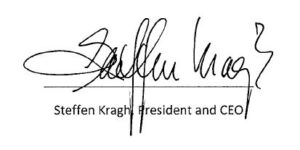Statement for the UK Modern Slavery Act
This statement has been prepared and published on behalf of Egmont for the financial year ended 31 December 2023, in accordance with the UK Modern Slavery Act 2015.
Introduction to Egmont
Egmont is a leading Nordic media group with a dual purpose. Every day we bring stories to life, and we empower children and young people at risk to pursue a good life. Egmont has more than 6,000 employees across more than 100 companies, primarily located in Denmark, Sweden, and Norway, contributing through companies such as Nordisk Film, Story House Egmont, TV 2 in Norway, Lindhardt og Ringhof, and Cappelen Damm. As a commercial foundation, we have spent part of our profits to help others for more than 100 years. In 2023, we donated 14.9 million EUR to support children and young people in completing an education and pursuing a good life.
Egmont’s supply chains are varied and complex. Our assessment of the diverse group of suppliers is based on where our due diligence shows the greatest risk of labour exploitation.
Egmont is committed to the ten principles of the United Nations Global Compact (UNGC), the United Nations Guiding Principles on Business and Human Rights, and the Core Labour Standards of the International Labour Organization (ILO). Ensuring fair working conditions is an integral part of Egmont’s corporate culture. Egmont operates a number of policies to ensure that its companies and relevant business partners conduct business in a transparent and ethical manner and in compliance with relevant standards and legislation, including Egmont’s Business Ethics Policy, Egmont’s Code of Conduct, Egmont’s Group Recruitment Policy, and Egmont’s Whistleblowing Policy.
If Egmont experiences or is made aware of an instance of modern slavery, it will be handled by the Corporate Legal & Compliance team.
Supply chain due diligence
Business partners and suppliers (and their subcontractors) are required to comply with Egmont’s Code of Conduct. The Code of Conduct sets out Egmont’s requirements on labour standards within the supply chains of licensees and suppliers, and it includes the requirement for appropriate remedy where workers’ rights have been breached.
Egmont’s Code of Conduct together with the Egmont Social Compliance Programme operationalizes Egmont’s efforts against modern slavery in supply chains.
The Egmont Social Compliance Programme sets out processes and requirements to ensure that human rights and labour rights in the supply chain are respected and protected, and that violations are remedied. Based on a risk assessment of the countries and sectors in which the relevant suppliers operate, key direct suppliers and chosen sub-suppliers may be subject to social audits. Egmont’s country risk assessment operates with the three risk groups set out below:
- Country Group 1: Audit is required at least every 12 months.
- Country Group 2: Audit is required every 12-24 months based on audit result.
- Country Group 3: Audit may be requested based on an ad-hoc basis, but some suppliers operating in this group will be required to complete an Egmont Self-Assessment Questionnaire (Egmont SAQ) upon requested.
Egmont promotes a continuous improvement approach to supply chain management, acknowledging that not everyone is immediately able to meet our requirements in full. We encourage factories to address all detected issues and take appropriate actions to correct the issues and prevent them from happening again. However, we have a zero-tolerance approach to the most serious rights abuses, as set out in our minimum compliance standards.
By the end of 2023, Egmont had 239 active suppliers registered. A total of 197 audit reports and Egmont SAQs had been evaluated with an average of 3.02 findings per audit/SAQ, which demonstrated a decline in issues detected at our suppliers. Two inspiration letters with best practices on the most frequent violations were distributed to all relevant suppliers to strengthen their awareness. We will continue to support and improve supplier compliance through close dialogue, training, and inspiration letters.
Business Ethics Policy and People Survey
All relevant Egmont employees are well-informed about the policies and rules of conduct they must comply with and the rights they have through group-wide communication and training measures concerning Egmont’s Business Ethics Policy. During 2023, the business ethics e-learning was automatically assigned to all new employees. By the end of December 2023, 96% of the relevant employees had completed the training. The training programme has also been rolled out to acquired companies, and selected training has been made in certain areas based on a risk assessment. In addition, Egmont regularly conducts an employee survey addressing, inter alia, working conditions and employee satisfaction. If survey results indicate a need for improvement, appropriate measures are implemented. The most recent employee survey took place in September 2023.
Planned actions in 2024
Egmont will run refresher business ethics e-learning for relevant employees and conduct awareness training on selected focus areas, including conflicts of interest and trade sanctions. Egmont will update its Code of Conduct and guidance regarding implementation of the Code into relevant agreements based on a risk assessment. Finally, Egmont will run awareness campaigns to ensure that all its employees know where and how to address serious concerns relating to the conduct of managers and other employees in Egmont, including the option to use the whistleblowing system.
You can read more about Egmont’s work on human rights and other Corporate Social Responsibility topics through www.egmont.com.
This statement was approved by Egmont’s board of directors and will be reviewed annually.
-o0o-
Egmont International Holding A/S


